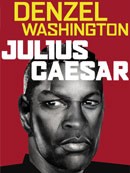
The production of William Shakespeare's Julius Caesar, that is about to open at the Belasco, is a bloody and noisy reading of this venerable warhorse. The arriving audience is greeted by muted martial music that sounds like it's coming from a junkyard band consisting of rusty horns and tattered bagpipes. This drone -- which after a while almost becomes contagious, but ends up ultimately being annoying -- is played up to the start of the performance. On stage, we see a curtainless stage cluttered with dilapidated Roman ruins, a couple of headless and armless classical statues near the side balconies, as well as a shopping cart filled with junk. Before the start of the play a homeless man staggers onstage, sits on the floor by his cart, and scratches his scraggly beard. He is, of course, the Soothsayer. Not the seer that Shakespeare intended, I'm sure, but then again, this is not the production that he had in mind either. A giant banner on stage with Julius Caesar's image is adorned with a laurel wreath and a crown. Caesar wears a beret and fatigues, as if he were the ruler of some modern police state.
And that's exactly the point of departure of this production: to make it modern. Set in a contemporary dictatorial country, the largely male cast is dressed in suits and ties during Rome's times of peace, and when civil war erupts after the title character is assassinated everyone switches to military fatigues and camouflage.
But this conceit by director Daniel Sullivan is obviously not new. As a matter of fact, it has almost become a cliché by now to set a classic play in a time period other than what the author originally intended. By the way, everyone should know that back in 1937, the then newly-formed Mercury Theater staged a modern-dressed production of Julius Caesar. That brave experiment revolutionized modern Shakespearean staging. That ground-breaking production was produced and directed by Mercury Theater founder Orson Welles.
I attended the Wednesday matinee on March 30, not so much because I wanted to see this play, but more because I wanted to experience Denzel Washington on the stage once again. Many years ago, when I was a freshman undergraduate at Fordham University in Lincoln Center, my English professor, Robert Stone, urged us to see a performance of a play that had been written by a student at the college. In the cast, playing a wheelchair-bound, cantankerous old man was a senior making his last performance at Fordham. His name was Denzel Washington. As a junior he had starred in Eugene O'Neill's The Emperor Jones, and Shakespeare's Othello. By the time he was a senior, thanks largely to the tutelage of Robert Stone, Denzel Washington was on his way to becoming a star.
He gives a very powerful and believable performance in the role of Brutus. It is the best role Washington has had since he starred in Spike Lee's film Malcolm X. The declamatory style that he adopts for the role of Brutus reminds me very much of the cadences he adopted when he played the slain civil rights leader. He is the star of this show, the reason for its existence, and the sole reason why you should go to the Belasco to see it.
Otherwise, the production is confused, bloody and very noisy. I don't remember ever having seen a more graphically violent play on Broadway. The stage blood flows freely in this production, not only during the murder of Caesar, but in the second act scenes of war. Also, in an effort to make things really relevant, the director has staged a particularly disturbing torture and decapitation scene that will remind everyone of the realities of the current situation in Iraq. The second act also features unnecessary, earth-shaking special sonic effects that, although very realistic, also go overboard. I am certain that the people outside the Belasco Theater can hear the roars coming from within.
The only roars that matter, in my opinion, are those coming from Mr. Washington's performance, and those from the appreciative sold-out crowds.
No comments:
Post a Comment